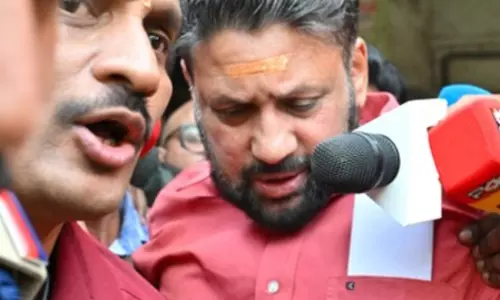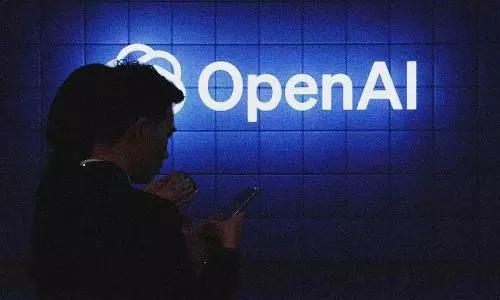
Kerala's Plus-One Admissions and Forward Caste Reservation
text_fieldsImage Courtesy : https://www.thehindu.com
It has become a routine spectacle in Kerala that following publication of SSLC results, students and parents make a scramble for seats in Plus-One; this is especially so in Malabar. Even students coming out with high grades may not make it to their preferred schools or streams of their choice – a state of affairs remaining unchanged for several years now. Apart from the usual seasonal clamour during admission time for increased seats, a sustainable solution still remains a distant goal.
This year, 4,17,101 candidates have qualified for higher students as against a seat availability of 3,61,746 seats. In other words, 55,355 students of Kerala who clear SSLC from public and aided sector schools have to search other avenues for Plus-One education. Furthermore, with the addition of students from CBSE, ICSE and other state boards' streams, the race for the limited number of seats will only intensify the situation. Even if an ad-hoc solution of adding 20 % supplementary seats is adopted, as has been the practice for several years now, at least 75,000 students will still have to resort to the open school stream.
Instead of resolving this crisis once and for all, the government and education department now seems set to take steps that will only aggravate the situation. The move to introduce reservation of 10 per cent of seats to the Economically Backward Section (EWS) of forward castes, has to be seen in this background. Although the General Education Directorate has not issued any notification for forward caste reservation for Plus-One admission this year, reports indicate that under pressure from communities concerned, the government is inching towards such a decision. If that happens, it will certainly turn into a legal tangle that will strike at the very root of reservation. It was in January last year that parliament passed a billl promising 10 per cent reservation for forward caste candidates with an income ceiling, in public and private sector employment and in educational institutions. The bill was moved in the Lok Sabha without serious study or debates, but was supported by legislators including those from the Congress and CPM. It was later passed by Rajya Sbha too and eventually notified as law.
As part of the implementation process, Kerala also issued a notification for forward caste reservation in February this year. Already, professional colleges have implemented reservation based on this. Forward community organisations including Nair Service Society (NSS) are demanding that it should be applied in Plus-One admissions as well. They calculate getting a favourable response to the demand from a state government, that had taken a stance in favour of economic reservation. For, even before Modi government brought in legislation for such a reservation, the current government in Kerala had implemented forward class reservation in appointments in Devaswom Board. The same is likely to be repeated in the matter of Plus-One admissions. Therefore, a circular announcing reservation for forward caste can be expected any day from General Education Directorate even before the stage of first allotment.
As a matter of fact, the concept of reservation for forward castes overturns the very principle behind community quota, which was necessitated by historical reasons and is being continued on the same grounds. The current move is patently a move towards a system of economic reservation. If at least for the same of argument, the economic criteria are accepted, then such a reservation should be extended to all sections of the society. But as it stands, the EWS principle is applicable only to forward castes, which is evidently unfair. In addition, there is the legal obstacle that this will reduce the percentage of open general seats to below 50 per cent. And there is also the serious underlying issue that over ten thousand students will be denied the opportunity of education.
In the current scenario, at least 15,000 seats will have to be allocated to forward communities. And in Malabar region, already suffering from severe shortage of seats – with Malappuram bearing the brunt with a deficit of nearly 25,000 seats – forward community reservation will end up only as denial of seats to backward communities. The government is in an attempt to solve this through creating additional seats as reflected in the announcement of 20 % additional seats. But the idea of such an increase in classrooms, already crowded by over 50 students, is unscientific per se, and will only lead to a fall in standards.
However, even as Malabar is grappling with a seat deficit, no less than five districts in the state have excess seats that lie vacant. The present crisis can have a lasting solution only by transferring such excess seats to the districts in Malabar and by sanctioning fresh batches there. This is not an issue to be set aside under the excuse of financial crunch. Even then, the left front government will have to array further justifications to implement the distorted policy of forward class reservation






















